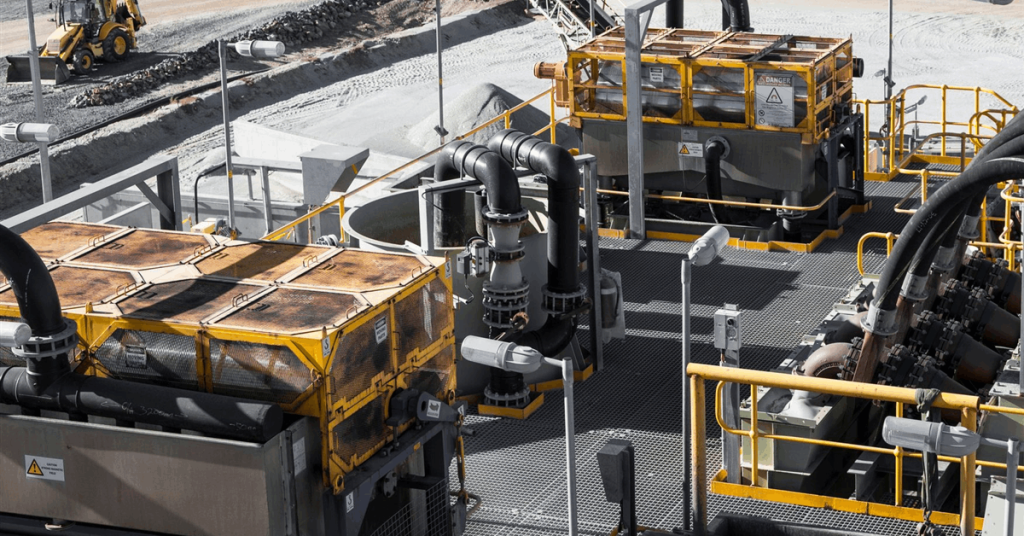The Department of Energy (DOE) intends to open funding opportunities amounting to nearly $1 billion for projects that would curb the United States’ reliance on imports for critical minerals and materials.
In support of the “Unleashing American Energy” presidential order, the planned packages aim to “advance and scale mining, processing and manufacturing technologies across key stages of the critical minerals and materials supply chains”, the DOE said in a statement online.
The DOE’s Office of Manufacturing and Energy Supply Chains (MESC) plans a Notice of Funding Opportunity (NOFO) offering up to $500 million to help expand critical mineral and materials processing and derivative battery manufacturing and recycling.
“The proposed funding opportunity supports demonstration and/or commercial facilities processing, recycling or utilizing for manufacturing critical materials which may include traditional battery minerals such as lithium, graphite, nickel, copper, aluminum, as well as other minerals that are contained within commercially available batteries, such as rare earth elements”, the DOE said.
“An award requires a cost-share of at least 50 percent by the recipient”.
Under the Critical Minerals and Materials Accelerator program, the Advanced Materials and Manufacturing Technologies Office expects to offer up to $50 million early this fall.
“The CMM Accelerator promotes technology maturation that can unlock capital investments and facilitate domestic commercialization”, the DOE said. “The proposed NOFO addresses several areas of interest, including processes in the rare-earth magnet supply chain; processes to refine and alloy gallium, gallium nitride, germanium and silicon carbide for use in semiconductors; cost-competitive technologies for direct lithium extraction and separation; and critical-material separation technologies that allow for the co-production of useful products from byproducts and scrap”.
Domestic industrial facilities that can derive valuable mineral byproducts from their processes could be offered about $250 million by the Fossil Energy and Carbon Management Office. “To derisk the technical uncertainty and financial risk for commercial deployment, many technologies must be piloted at an industrial scale in an industrial facility where material feedstocks can be processed”, the DOE said.
“The proposed NOFO addresses topic areas pertaining to both industry at large and the coal-based industry”.
The MESC Office plans a separate offer of up to $135 million to help reduce “America’s dependence on foreign sources of REEs [rare earth elements] by demonstrating the commercial viability of methods for domestically refining and recovering REEs from mine tailings, deleterious material and waste streams”, the DOE said.
“An academic partner is required as a part of the project team and an award requires a cost-share of at least 50 percent by the recipient”.
Early this fall, the Advanced Research Projects Agency for Energy (ARPA-E) is expected to announce project selections for a $40-million program to develop technologies that recover critical minerals from industrial wastewater.
ARPA-E expects technologies supported by its Realize Energy-Rich Compound Opportunities Valorizing Extraction from Refuse Waters (RECOVER) Program to “complement more traditional mining operations to access these materials and potentially meet a significant portion of America’s needs using supplies that might otherwise go to waste”, the DOE said.
Energy Secretary Chris Wright said, “For too long, the U.S. has relied on foreign actors to supply and process the critical materials that are essential to modern life and our national security”.
To contact the author, email jov.onsat@rigzone.com
Generated by readers, the comments included herein do not reflect the views and opinions of Rigzone. All comments are subject to editorial review. Off-topic, inappropriate or insulting comments will be removed.
element
var scriptTag = document.createElement(‘script’);
scriptTag.src = url;
scriptTag.async = true;
scriptTag.onload = implementationCode;
scriptTag.onreadystatechange = implementationCode;
location.appendChild(scriptTag);
};
var div = document.getElementById(‘rigzonelogo’);
div.innerHTML += ” +
‘‘ +
”;
var initJobSearch = function () {
//console.log(“call back”);
}
var addMetaPixel = function () {
if (-1 > -1 || -1 > -1) {
/*Meta Pixel Code*/
!function(f,b,e,v,n,t,s)
{if(f.fbq)return;n=f.fbq=function(){n.callMethod?
n.callMethod.apply(n,arguments):n.queue.push(arguments)};
if(!f._fbq)f._fbq=n;n.push=n;n.loaded=!0;n.version=’2.0′;
n.queue=[];t=b.createElement(e);t.async=!0;
t.src=v;s=b.getElementsByTagName(e)[0];
s.parentNode.insertBefore(t,s)}(window, document,’script’,
‘https://connect.facebook.net/en_US/fbevents.js’);
fbq(‘init’, ‘1517407191885185’);
fbq(‘track’, ‘PageView’);
/*End Meta Pixel Code*/
} else if (0 > -1 && 99 > -1)
{
/*Meta Pixel Code*/
!function(f,b,e,v,n,t,s)
{if(f.fbq)return;n=f.fbq=function(){n.callMethod?
n.callMethod.apply(n,arguments):n.queue.push(arguments)};
if(!f._fbq)f._fbq=n;n.push=n;n.loaded=!0;n.version=’2.0′;
n.queue=[];t=b.createElement(e);t.async=!0;
t.src=v;s=b.getElementsByTagName(e)[0];
s.parentNode.insertBefore(t,s)}(window, document,’script’,
‘https://connect.facebook.net/en_US/fbevents.js’);
fbq(‘init’, ‘1517407191885185’);
fbq(‘track’, ‘PageView’);
/*End Meta Pixel Code*/
}
}
// function gtmFunctionForLayout()
// {
//loadJS(“https://www.googletagmanager.com/gtag/js?id=G-K6ZDLWV6VX”, initJobSearch, document.body);
//}
// window.onload = (e => {
// setTimeout(
// function () {
// document.addEventListener(“DOMContentLoaded”, function () {
// // Select all anchor elements with class ‘ui-tabs-anchor’
// const anchors = document.querySelectorAll(‘a .ui-tabs-anchor’);
// // Loop through each anchor and remove the role attribute if it is set to “presentation”
// anchors.forEach(anchor => {
// if (anchor.getAttribute(‘role’) === ‘presentation’) {
// anchor.removeAttribute(‘role’);
// }
// });
// });
// }
// , 200);
//});

